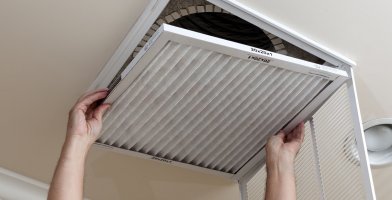- No Obligations
- Stop Paying Too Much For Your Contractor
- No Spam Calling
- Screened & ID Checked Contractors only!
Radiator Repair Near Me: Services & Cost Of Repair
5
Find out all the costs associated to radiator repair services in our Radiator Repair Near Me guide. We included up to 4 free contractor quotes.
Radiators are designed to transfer heat from one medium to another for heating and cooling. Most radiators are made to function in buildings, automobiles and electronics. They are a source of heat to its surrounding environment or used to cool the coolant or cooling fluid supplied to it. However, once in a while, radiators can fail to operate as expected and as a result, you may have to replace or repair it.
Therefore, if you choose to repair your radiator, you can follow our guide, which entails the signs of radiator failure, how to prevent the failure, the costs of repair, questions to ask your radiator repair contractor and tips on how to choose the best radiator repair professional. First, let’s look at the primary functions of a radiator at both home and in automobiles.
Cooling the engine
When it comes to automobiles, radiators are meant to cool internal combustion engines in railways locomotives, piston-engined aircrafts, stationary generating plant, motor vehicles, and other systems that use such engines.
The coolant is circulated via the engine block to absorb heat from the engine so that it can cool the engine down. Then, the hot coolant flows into the radiator’s inlet tank, (located either on the side or on top of the radiator) from which it is dispersed across the core of the radiator through the tube to the tank on the opposite side of the radiator. While the coolant passes through the tubes, it transfers most of its heat to the radiator tubes, which as a result, transmits the heat to the fins, which are placed between the tubes.
The coolant is water-based with additives such as glycols that prevent freezing and others that reduce the probability of cavitation, erosion, and corrosion.
Signs of a failing radiator
Normally, leaks and overheating are most visible signs of a faulty radiator. However, loose parts and leaking hose can also result in both problems. The following is a complete guide to the symptoms of failure:
1. Radiator Leaking
Since the radiator is designed to transmit heat from the coolant and then return the coolant to the engine, the liquid must pass through the radiator’s reservoir. However, if the radiator gets a crack or fails, the coolant may start leaking. It’s not always easy to detect such leaks since the coolant may drip onto the road while driving in the parking lot. Moreover, such leaks can occur at any part of the vehicle’s cooling system. Thus, coolant pouring or dripping on the floor or garage does not always indicate a faulty radiator.
To identify the source of leakage, you should visit a professional mechanic to carry out a pressure test. During the test, the mechanic will add a coloured dye to the coolant and then use a machine to put pressure on the cooling system. As the dyed coolant leaks, it will leave a temporary stain that can help you identify a faulty radiator.
2. Overheating
The primary function of a radiator is to keep the engine cool while running. However, if the radiator is bad, it’s cooling effect may be degraded or fail altogether.
A faulty radiator leads to high temperatures in the engine or a complete breakdown due to overheating especially during heavy acceleration, if driving at a higher speed or when halting after driving on a highway.
However, overheating may also be a sign of a faulty radiator cap or a failing thermostat. Likewise, a vehicle that overheats after starting may have electrical problems or a defective temperature sensor unit.
3. Drop in Pressure
If your radiator is corroded, it produces low levels of pressure. A working radiator should produce between 10 PSI and 12 PSI. If the levels are low, the radiator has a problem. You can use a pressure gauge to identify the pressure levels.
4. Low Coolant Levels
If the levels of the cooling fluid are low, the radiator could have a leakage. Although the coolant reduces with time, a sudden drop of the coolant level could indicate a problem. Therefore, check connections and hoses to ensure all parts are tight. However, if the parts are tightly fixed, there could be a hole elsewhere.
5. Rust
Rust around or on the radiator can be a sign of corrosion or leak. As the fluid leaks, it corrodes the metal, which in turn causes rust.
6. Radiator Sludge
As we said earlier, the coolant is water-based and green or yellow. If a radiator becomes faulty, rusts or gets debris, it may contaminate the fluid, which becomes oily or rusty. A rusty radiator will cause flaking, which creates a sludge that inhibits cooling. For this reason, if your radiator develops a sludge, you should replace it.
Preventing Failure
If possible, you can prevent your radiator from failing. Some basic maintenance practices can help prevent cracking and corrosion.
1.) Straighten Bent Fins
The radiator’s metal fins help in transferring air into the cooling system. The air together with the fluid cools the engine. If the radiator fins are bent, they will block the air from getting in, which as a result causes overheating. Although a small blocked area cannot cause a significant problem; a large area will need attention. You can straighten the fins with radiator combs to avoid further damage.
2.) Replace the Coolant Frequently
Naturally, coolant levels tend to run low with time, and it also becomes dirty after long use. Dirty coolant can lead to corrosion.
The fluid is also used as an anti-freeze, which prevents the hoses and the radiator from cracking during cold weather conditions. If you cover a lot of mileage or live in hot areas, it is advisable to change the coolant once in a year. On the other hand, if you reside in average climates, you can change the coolant after every two years.
The cost of car radiator repairs
A radiator performs a very critical function as it keeps your engine from overheating and cool enough to run correctly. It is therefore advisable to get the coolant replaced after every 25,000 to 40,000 miles to avoid the tanks in the radiators to crack causing leakage due to high engine temperatures
Coolant leaks can be spotted easily when your car is continuously overheating, or with the greenish, orange or red liquid coming out of the car. Once you see this, you need to fix it as soon as possible to avoid severe internal damage to the engine and overheating which usually causes the engine to seize up and stop working. Overheating can also lead to a head gasket blowing whose cost of repair is very high. It is, however, hard to determine the source of the coolant leak, but you can do the following to detect exactly where the leak is coming from.
Place under your car a cardboard, leave it overnight. Check, and determine roughly, where the leak is coming from. Check where the leak is coming from exactly, whether from a hose or the radiator itself. The leak is normally above the spot on the ground so will need to work your way up until you find the leak. You can also listen to the hissing sound which means the coolant is spraying from a radiator or hose
Check also the temperature gauge on your dashboard to see if the temperature needle is fluctuating. Check if the temperature is higher than normal which is a clear indication of a leak
Once you have found the spot, determine how large or small it is. If you notice that the leak is dependant of the hose clamp or hose you need to get a new one. If it’s coming from the radiator, you will need to replace it.
Once the problem is detected, you will need to take your car to the mechanic to have it repaired or for the mechanic to antifreeze the leak. The thermostat can be replaced when replacing the radiator or radiator hose. The mechanic is in a better position to flash out all the old coolant and replace it with the new coolant to avoid any contamination. However, it is important to note that repair cost can differ and sometimes be very costly; that depends on where the leak is coming from.
A leak caused by the blown head gasket can results in greater costs. It can cost you roughly above 74$ to buy this part only. This part is vital to your car’s engine. Leaks can lead to the coolant and the oil to mix up or lead to compression, which makes it hard for you to drive your car. Fixing it, hence, requires a lot of labour, and you will be required to pay 390$ to 420$ or more to cater for the whole repair process.
If the hose is severely damaged, you need to buy another one instead of repair. The entire cost of replacing the radiator hose ranges from 40$ to 65$. This is because it’s a simple fix process and does not require a lot of labour. However, depending on the type of the car and the size of your vehicle, fixing or replacing the radiator will roughly cost you 300$ or slightly more.
The cheapest and quickest repair is the use of the radiator leak sealant. However, this is not meant for a long-term fix, and it is a DIY scenario. All you need to do is to pour stop leak into the radiator cooling system and give a few minutes for the engine to run and cycle through the cooling system. Depending on where you buy the radiator heat sealant and the size, it will only cost you less than 5 dollars.
Tips for finding the best radiator repair company near you
It can be time-consuming, moving from one radiator repair company to another trying to find one that best suits your preferences and needs. You need a repair company that is not only reputable but also has professional mechanics with diagnostic equipment, up- to date information and does high quality and recommendable work. The following tips are essential to guide you through into finding the best repair company or shop near you that will fully satisfy your needs.
1. Ask for referrals
If you have no idea where to start, friends and family can be a good source of information, especially those who have had an experience with a certain radiator repair company. A word of mouth or confirmation from them means you are getting an honest insight of their experience and this will help you make an informed and worth it decisions as you won’t end up wasting money on a scam company.
2. Do extensive research on prices and compare
When your car has a coolant leak, or if you are experiencing problems with your heating system in your home, you may tend to be in a rush to get it fixed. During this time, your judgment is clouded causing you to make hasty decisions that may result in you paying very high repair costs. If you want to get a top-notch service from a good company at a reasonable cost, have several quotations from different companies, compare their prices and choose the one that you feel most comfortable with and one that suits your preference.
3. Remember, cheap is expensive
Most of the time, prices offered by different companies on radiator installation or radiator repair affects one’s choice in deciding which company to adopt. Do not always go for repair companies that offer cheap repair costs as this may also mean cheap service. It is, therefore, recommendable to check the reviews of these companies from the unbiased customers’ online and honest individuals who have had experience with these companies. One of the best online companies that you can research for online reviews is Better Business Bureau.
4. Explore the companies’ profile
While looking for the best car radiator contractor, it is important to look at the credentials of each shop. Explore the customer service and the warranty policies that will cover you against any mechanical or repair issues that may arise after the procedure is complete. Additionally, if it’s an automobile company, you can confirm if the company is ASE (Automotive Service Excellence) certified or if the companies have passed the safety and regulatory standards. You can also look at the years of experience that the company has been in operation and technicians certifications from a nationally recognised organisation to get a clear picture of how efficient and reliable the company can be in providing the radiator repair and installation services.
5. Physical appearance and amenities
These are the facts that can`t be ignored while finding the best company for your radiator repair. A well-organised, clean and comfortable waiting areas form a good basis for judging the professionalism of the repair company.
6. Accessibility of the company
A good repair shop for your radiator should be easily accessible and the working hours or opening days should not conflict with your work schedule or routine. The distance also should be reasonable enough to access easily and with less cost
7. Check your local yellow pages
One needs to explore more than just in the city where you come but also from the neighbouring areas. You can get confused when shops advertise themselves that they offer radiator repairs, but into closer research, they offer auto repair services only. Therefore, you need to call the repair company and clarify clearly on what kind of radiator services they are offering.
8. Check in the NARSA to find the radiator repair company near you
NARSA is a global trade association, dedicated to its members who specialise in providing repair and maintenance of such things as heat exchangers such as radiators and condensers. NARSA (National Automotive Radiator Service Association) specialises in listing all the radiators ranging from the ones near you to the ones at far or in distant places. This will provide you with a platform with a variety of choices of the company to choose from and the one that will fully satisfy your needs and preferences.
9. Check the radiator company in your town
Not every company is listed in the NARSA; It is, therefore, advisable not to overlook the company in your local town which may be offering the best radiator repair services. However, you will need to carefully analyze the company, its profile, and certification and find out the general reviews from people and friends who have had experience with the company before finally entrusting them to take care of your radiator repairs and installation of new ones in your homes.
10. Ask all the necessary questions and concerns that are unclear
Another important thing to do is to call the servicing company and ask all the necessary questions and any concerns that you feel need to be addressed and clarified. If you feel their services and answers are not convincing or satisfactory, choose another company. There are a variety of radiator companies offering repairs out there so don’t be tied down to one. Of course, another consideration is the cost of repair, which should be reasonably priced. With this armed and relevant information, you can now feel comfortable to proceed and allow for the repairs and installation of the radiator(s).
Choosing the best repair company can be a little overwhelming especially if you don’t have the necessary skills that will guide you through into finding the company that will offer long-lasting radiator repair services. It is however advisable not to be in any rush to get your radiator repaired. Additionally, before you call a single company, call your friends, neighbours and family members for recommendations. High praises on a company means it most likely provides exemplary services and hence a good choice for your current problems. Search online and ensure you are getting the correct information before you finally decide.
10 questions to ask a radiator contractor
When you decide to visit a local radiator repair shop, you can ask the following ten questions for total satisfaction and to avoid scams.
1. Can you give me the quotation or estimated cost?
Most repair companies have a standard or average cost that they give to their clients. However, ensure that the company knows the particular problem with your unit before they give you an estimate. You might not get a guaranteed assessment of the problem if the mechanic hasn’t looked at the radiator. It is advisable to get the quotation in writing to avoid payment problems afterwards.
2. Are your mechanics/technicians trained and certified?
When you visit repair workshops, you expect to find specialised and skilled technicians or mechanics for best results. Therefore, to reduce future repairs, ensure that the mechanic(s) who are working on your radiator can professionally handle the issue at hand. Whether it’s one repairer or a team handling the repair task, make sure they can all handle the job. You wouldn’t want an untrained mechanic or technician to perform the repair.
4. Do you offer a written warranty?
Some of the best radiator repair companies use their own equipment and parts during installation, replacement and repair. Therefore, when working with a radiator contractor ask whether the repair is covered by warranty. If so, ask the number of years guaranteed after the repair and whether it includes labour and spare parts. Also, ask whether they provide a maintenance package. This will spare you the agony of any damages that may come up due to unprofessional repair services the company offered.
5. How long have you been in the radiator repair business?
A business that has operated in the industry for long will most probably offer the best service since they have withstood the test of time. However, if you find new employees every time you visit the workshop, you better find another contractor. This is because the new employees may not have the skills and experience to handle your problem as the technicians who have worked in the same workshop for long. You need to work with a technician who will be there today and in the future. Also, look for a tangible proof of their financial stability.
6. Do you have any referrals?
No radiator repair contractor can admit having performed a poor job. So, before you hire him or her, ask for at least three references. The referrals should include names and phone numbers. You can contact the past clients to ask whether they were happy and satisfied with the work of the contractor.
If the company has a website, you can check ratings and reviews to have a glimpse of the services they deliver. You can also check their latest products and techniques via the site. It should have useful information as well as updated once in a while if not daily.
7. From which manufacturers do you source your spare parts?
Today, there are manufacturers producing radiators, and each provides different models. A repair company that depends on only one manufacturer has limited options. It is advisable to choose a trusted professional who works with various manufacturers and has extensive knowledge of technology when choosing the right equipment for every task. The expertise and skills of a radiator repair company will determine whether you will get high-quality services as well as satisfaction.
8. What is/not included in the quotation?
Quotations tend to look alike, but in the real sense, the differences are huge. In fact, the important thing is what is stated but not what is not included. The difference in quotations is whether or not the existing parts that connect to the unit will be replaced with new components including hoses, fins, connectors, and pipes. If any of the parts need repair, don’t cut corners to lower the cost; it may result in failure and expensive repair in the long run.
The quotation should include, in detail, all the parts required for the repair, permits, labour and warranty and maintenance information.
9. Do you offer a maintenance program?
Repair companies that provide their clients with a maintenance program are confident about their services and technicians or mechanics. Such a program will ensure that you stay updated with consistent maintenance for your vehicle or home. The program helps you to keep your radiator lubricated, clean, pressurised and the best performance. The cost-effective preventive program can help prevent future radiator breakdowns.
10. Do you offer a money back guarantee?
In most cases, as a client, you will only experience one side of the radiator repair company that you choose to repair your unit. You may have selected a contractor based on the impression you got from friends or salesman. Later, when you have to cope with faulty repair, you may find that the company lacks knowledge and professionalism required to handle your problem quickly. The recommended way to avoid such instance is to request a written 100% money back guarantee. It can be of great help when you encounter an unmanageable issue so that you can have your money back. It is vital to protect your investment since it is an essential gadget in your vehicle or home.
Always keep in mind that a reputable company or contractor will not mind when you ask questions. It shows your preparedness and care for the longevity of your vehicle or home.




